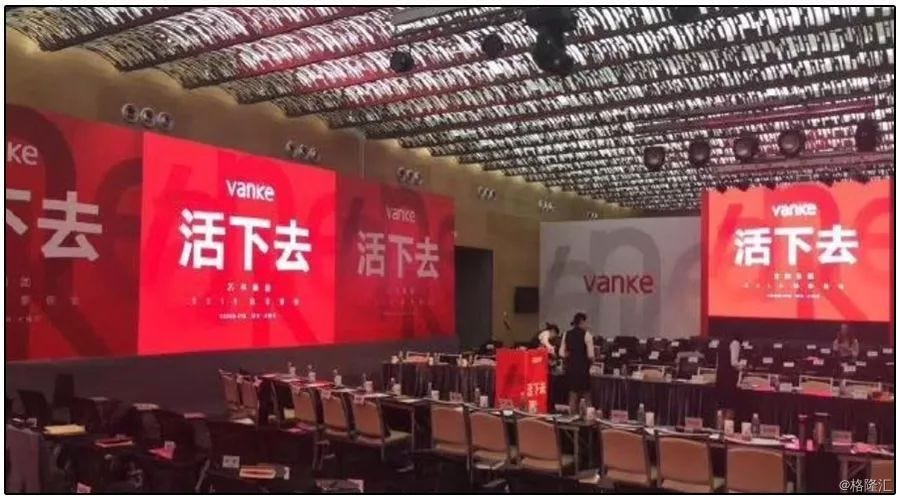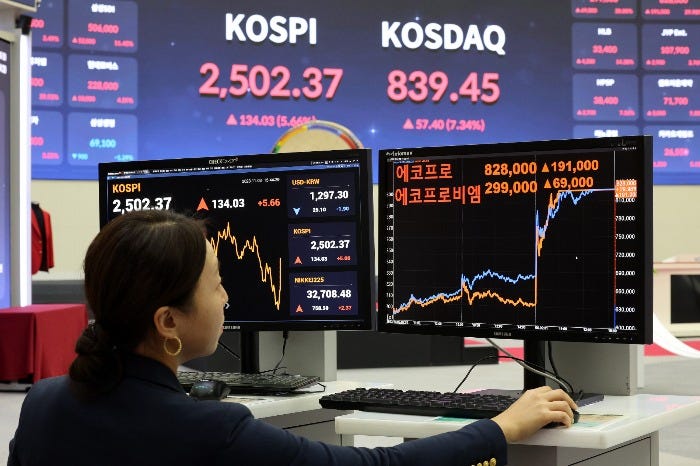Vanke, cross-border data, MSS on financial security, 18.3 Plenum, foreign-educated party cadres, Albanese, China Project - Week in Review #3
Welcome to the 3rd issue of Week in Review, where I give you my personal review of events about China that matter beyond news cycles. For why I write, please check here.
In today’s issue, I will cover:
Shenzhen government’s support for Vanke
Business database Qichacha passes security test for resuming overseas operations
Ministry of State Security opines on financial security
10th anniversary of the Third Plenum of 18th Party Congress
China’s securities regulator’s drive to consolidate investment banking industry
Regional pilot programs to admit foreign-educated graduates into senior cadre preparatory roles
Australian PM’s China visit
Shutdown of China Project.
The profound
#1 Shenzhen government steps in to signal strong support for Vanke
Despite being among healthiest real estate developers, rumors started to circulate that Vanke was going to default on its debts, sending its USD bonds to dangeous lows. Authorities wasted no time to signal support. According to Reuters:
State-owned Shenzhen Metro, the largest shareholder of Vanke, China’s No.2 property developer by sales value, told a meeting with financial institutions after trading hours on Monday that it had prepared more than 10 billion yuan ($1.4 billion) worth of “market tools” to boost Vanke’s cashflow.
The Shenzhen state asset regulator (SASAC), which owns Shenzhen Metro, also showed its support at the meeting, according to press materials provided by Vanke. It reassured investors that Vanke did not have financial or management risks, and said it would coordinate other state-owned enterprises and financial institutions to help Vanke if needed.
Chinese real estate development resemble the highly leveraged banking industry. They take in “deposits” from the public in the form of down payments, take on debts from banks as well as bondholders, and use these leverages to purchase land and build properties, all juggling around with very little equity. In this kind of business model, all it matters is confidence. If the market is no longer confident in you, no matter how healthy you are, the lack of confidence itself will doom you. Homebuyers will panic and stop buying your houses. Suppliers will panic and will delay deliveries. Your investors will panic and freeze financing. All the panics feed into a vicious loop. Imagined risks will quickly materialize, and before long you will be wiped out. This is just like a bank run. That’s why Shenzhen government’s vote of confidence is so crucial, just like the US Government’s role in stabilizing confidence during 08 financial crisis.
I also think this is a watershed moment for more than 2 years of implosion of China’s real estate bubble. For the past 2 years, what started as a self-induced deleveraging campaign has snowballed into a contagious wave of defaults. Real estate developers fell one by one, like a domino. First it’s some weaker, more risk-taking developers. Then it got to some huge but lower-quality names such as Evergrande. Then even state-owned developers such as Greenland defaulted, followed by some higher-quality big name such as Country Garden. There are also uneasy jitters around even higher-quality name like Longfor.
Vanke, who famously foretold today’s situation with the slogan "Stay Alive" as early as 2018 and made preparations accordingly, is the last fortress.
If Vanke falls, that will be the end. But if Vanke stands, it will also be the end of this domino, much like the rescue of Merrill Lynch from the fate of Lehman Brothers marked the turning point of the Great Financial Crisis.
Also worth noting is that Vanke is a legendary name that carries a much heavier weight than other developers. It has always been at the center of dramas. I always believe that if some insiders will write about the 2015-2017 Vanke hostile takeover saga in the future, it will be a much more exciting book than even Barbarians at the Gate. Looking back, that episode was really at the pinnacle of excesses of China’s real estate and financial industries. Many key players in that saga, no matter it’s Evergrande, Baoneng or even Anbang are now either bankrupt, semi-bankrupt or dissolved. Many people are now in prison. But Vanke still stands. One cannot help but wonder, if Shenzhen Metro did not step in as a white-knight at that time, where Vanke would have been today.
The interesting
#2 Qichacha passes security test for resuming overseas operations
This is a very important piece of news that shouldn’t evade your attention. According to Evelyn Cheng of CNBC:
Chinese business database Qichacha said Friday it passed a data export security assessment that allows the company to resume overseas operations. The news signals an easing in China’s increasingly stringent government controls over data sharing due to national security concerns.
Earlier this year, Reuters reported, citing sources, that Qichacha and similar databases had closed access to offshore users for months. Qichacha said in a press release on Friday that it is the first company to pass the Cyberspace Administration of China‘s data export security assessment for a platform providing inquiries into data around corporate creditworthiness.
Mu Chen and I iterated many, many, many times that the "China is locked inside an information black box" narrative, perpetuated by the likes of WSJ’s Wei Lingling is misplaced. China’s data regulatory regime is very, very young, and it takes some time to implement rules, set up precedents and generally get sophisticated. One should not confuse commonplace bureaucratic inefficiency with a state-driven, irrational drive for control. Some patience is always needed when studying China.
#3 Ministry of State Security on financial security
MSS is creating headlines again. This time they are having some harsh words (translated by Sinocism) on the financial industry and how to safeguard financial security.
I tend to think this kind of article as a follow-up to the newly concluded Central Financial Work Conference (CWFC), but not signaling any particular imminent action. Putting yourself in a bureaucrat’s shoes, it is natural to sound vocal support in your own way after some major high-level meeting is concluded.
I do have worries, however, that many regulators don’t seem to understand that we cannot talk about financial security in the same way we talk about say, food security or energy security. Food and energy are physical. But finance is intangible. Finance is essentially about confidence and confidence stems from mutually held trust that we can all play safely by the rules. If you are not happy about something, then enforce the rules or consult to revise the rules. But making threats is not good for establishing trust. If money is scared away, even for the wrong reasons, you will have no financial security to even talk about.
I hope a more centrally managed financial regulatory regime in the form of Central Finance Commission can help to facilitate this kind of understanding across different government bodies.
But I may be wrong. Coincidentally, also in this week, South Korea issued a ban on naked short selling. They even put a big fine on BNP Paribas and HSBC for this. (Imagine what kind of headlines you will see if China penalize Morgan Stanley or Goldman in this way?) The South Korean stock market responded by a huge rally. It seems it’s at least part of the East Asian culture to manage financial markets in such a heavy-handed way.
#4 10th anniversary of Third Plenum of the 18th Party Congress
Nov 9 marks the 10th anniversary of the important 18届三中全会 ("18.3 Plenum").
I vividly remember the moment when full-text resolution of that Plenum was announced. On that evening, I was waiting for my girlfriend (blushed) at the lobby floor of Cheung Kong Centre in Hong Kong, but my attention was glued to my phone, reading the full text word by word. The scope and the depth of that resolution is breathtaking, and I don’t recall many documents that gave me as stronger a sense of hope and optimism as this one.
Now 10 years later, the results are, at best, mixed. Caixin just published a serious-worded editorial, also sampled by Sinocism. I don’t entirely agree with Mr. Bishop’s assessment that the editorial "discusses how policies today have deviated so far from that Plenum a decade ago". I think some of the 60 articles from the 18.3 Plenum (I roughly estimate ~30-40%) have indeed been successfully implemented. These include a fundamental improvement of environment, a revolutionary restructure of the PLA from a 20th Century army to a combat-ready modern force, the abolishment of one-child policy, and centralization of anti-corruption authorities, among others.
However, the most crucial ones, namely the deeper reforms of basic economic structures and market dynamics seem elusive. I personally think tougher-than-expected geopolitical tensions (remember, in 2013 nobody predicted the rise of Donald Trump and the brand of protectionism he represents, nor did anyone foresee war in Ukraine) and 3 years of Covid-era controls are main reasons for this. We have to understand this: reforms can only take place in a safe environment. On the other hand, the heavy-handed crackdown on education and internet industries, as well as a more-severe-than-expected implosion of real estate industry certainly do not help.
Still, I belong to the camp who believe the original intentions in the "60 Articles" have not wavered. Politics have to adapt to circumstances, and a document like the "60 Articles" can only serves as a list of objectives. Put it in another way: Can you imagine if the Party had managed to complete even only 80% of the goals it sets out in a span of only 10 years, what kind of formidable, super-efficient political organization would we be looking at here?
I only wish the reform program can be restarted ASAP, in this unique window when Covid has ended and international relations have slightly improved. In this case, a voice like Caixin is a push for the right direction.
The underreported
#5 CSRC signals support for consolidation of domestic investment banks and brokerages
The CSRC, China’s securities regulator, held a meeting to discuss the to-dos as a follow-up to the CWFC. Among the topics, the one that caught my attention is that the CSRC will "support leading securities firms to become better and stronger through innovation, conglomerate operation, merger and restructuring, and to build first-tier investment bank."
Some background knowledge is needed here: China’s securities industry (a.k.a the sell-side) is a highly fragmented industry. There are more than 100 securities firms competing for investment banking and brokerage business. This is very much different from the West, where only a handful of so-called bulge bracket banks dominate the industry. Part of the reason is that every region and province controls one or two securities firm, almost like a trophy for the local leadership. Net results? Over-supply, low-quality and commoditized services and lack of global competitiveness.
Who will be the beneficiaries of this reform vector? Watch out for top securities firms, such as the so-called “3C1H 三中一华”, the Big 4 houses including CICC, CITIC Securities, China Securities and Huatai.
#6 Several provinces pilot admission for overseas-educated students to elite civil service program
This is not news, but something that happened a few months ago. Still, I find it worth noting here.
“Selected Graduates选调生” is a program of recruiting high-quality talents into the civil service. Many of the Selected Graduates are groomed for cadre roles. It used to be that only domestically educated students can join the Selected Graduates program.
Starting from 2024, however, in several provinces such as Shanghai, Beijing and Sichuan, those students from elite overseas schools can now apply to become Selected Graduates as well. (Different province has different definition of "elite school". In Shanghai for example, only around 70 universities, including the likes of Harvard, Yale, Stanford, National University of Singapore, Tokyo University and Sorbonne are recognized.)
Overall, this means that before long you will see many Harvard or Oxford graduates joining party leadership in counties, cities, provinces, or even, the central committee.
This policy totally makes sense. Every year there are millions of students going overseas for education, and they usually represent China’s best and brightest. It is a shame that there has not been an explicit path for people of such background to land a senior public job until now, possibly because of security concerns and bureaucratic inertia. This goes back again to our "lack of talents" explanation for many of China’s problems. And I think an influx foreign-educated talents into senior ranks will leave a lasting impact on China’s governance.
However, those who think Chinese government will suddenly "liberalize" because of this, Boris Yeltsin-style, will be disappointed. Many overseas-educated people, after seeing both sides, do not necessarily "liberalize" the way you imagine. Former President Jiang Zemin spoke fluent English and could converse on CBS 60 Minutes quite at ease. But when he scolded that Hong Kong reporter in the famous "too simple, sometimes naive" rant, nobody called him a liberal.
Yes, after an overseas education, we will become more open-minded, and we will see more clearly the pros and cons of different governing systems. But we are intent on applying what we learn to make this country a better place, with the same pragmatic spirit of late Premier Li Keqiang’s handwritten note that I shared at the end of last week’s letter: Look to the sky but plant our feet into the ground.
The honorable mentions
#7 Australian PM visits
Australian PM Anthony Albanese concluded a successful "detente" visit to China. Combined with the highly anticipated Xi’s visit to San Francisco next week, it seems we are sailing through some quieter periods in the Sino-Five Eyes relations in the near future.
For me personally, enjoying cheaper wines and lobsters from the fine country of Australia is definitely a huge plus.
#8 China Project shutdown
It’s a shame for China-watching community that China Project had to shut down.
Media business is always hard, especially when your views seem more neutral and balanced and do not wish to take a side.
To crack this problem, diversifying revenue streams is a must. For example, I think it makes more sense to build media business on top of a strong data and analytics business (e.g. Bloomberg), rather than the other way around. Sponsored content, and even e-commerce at some point should be considered as well. This is the business case that we want to prove with Baiguan - China Insights, Data, Context, built on the infrastructure of the data company BigOne Lab.
On a related note: Baiguan is currently looking for investors in a small angel round. If you are interested, come and find me.




